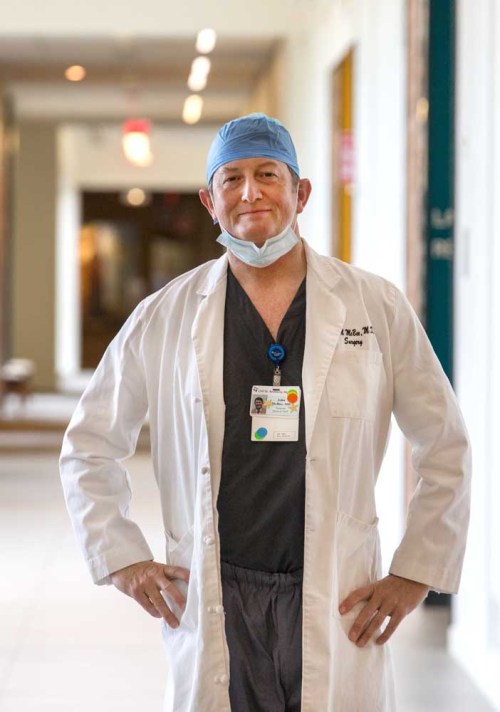Surgeons ease back into elective procedures
Published 6:00 am Thursday, May 7, 2020

- General surgeon John McBee eased back into doing elective surgeries and procedures this week as the state lifted restrictions.
PENDLETON — Surgeon John McBee gloved up Monday morning and stepped into a surgical suite at St. Anthony Hospital to perform a routine colonoscopy. The procedure marked McBee’s first elective surgery at the hospital in more than a month.
Gov. Kate Brown banned elective and nonessential medical procedures on March 23 that use PPE, such as gowns, masks and gloves. On April 23, she announced a framework for restarting elective medical and dental procedures that would begin as soon as May 1.
So Monday was McBee’s first time back in the hospital operating room for a nonemergency procedure since the ban, though the general surgeon continued to operate on emergency patients. Prior to the governor’s order, his general surgery practice averaged 80% elective and 20% emergency procedures.
He is easing back into it, doing only half his usual caseload for the first two weeks. Since McBee typically performed 10 to 20 procedures per week at the hospital, he is starting with five. Not every patient will qualify for surgery during this phase.
“During the start-up, cases will have to meet criteria,” McBee said. “Patients must be younger than 65 and not have serious underlying conditions, such as diabetes and immunosuppression.”
St. Anthony Hospital will carefully feel its way back to full power following the state framework and using guidance from national health officials and clinical associations.
“The safety of our patients and staff always come first,” said St. Anthony President Harry Geller. “We will continue to take significant steps to make sure it is safe to provide care and be treated at our care facilities. To avoid further delays in health care for our community, at a minimum we will need to have enough personal protective equipment and testing to keep our patients and staff safe and maintain adequate hospital capacity in case of a significant increase in COVID-19 cases.”
Precautions, such as universal masking and strict limitations on visiting, will remain in place.
“We won’t be able to provide every service right away — rather this will be a gradual process, with the most urgent procedures being prioritized by our clinical teams,” Geller said.
So it’s slow and steady with the constantly changing COVID-19 situation in mind.
“We are forging ahead with cautious optimism,” McBee said.
Good Shepherd Health Care System in Hermiston also resumed nonurgent surgeries and procedures. The hospital’s visitation restrictions will remain in place during the first phase.
“The first phase of the Oregon Health Authority’s reopening plan limits us to no more than 50% of our pre-COVID-19 elective procedures,” said Good Shepherd spokeswoman Caitlin Cozad via email. “Patients may be receiving a call from their physician and/or provider’s office to schedule health care needs that were postponed previously.”
Dentists, optometrists, veterinarians and other practitioners also may resume elective procedures in a slow, controlled manner. Clinics and dental offices must keep 14 days of PPE on hand. Hospitals much have a 30-day supply of PPE.
Optometrist Michelle Monkman said her partner at Vision Source Pendleton, Dr. Clay Briscoe, started seeing patients for regular exams and elective procedures on Monday morning. She will start back on Tuesday.
“We only have one doctor at a time,” Monkman said. “We’re working opposite days.”
Vision Source patients will experience a markedly different check-in procedure.
“Doors are locked,” Monkman said. “When a patient arrives, they knock and we give them paperwork. They do the paperwork in their cars. We call when it’s time to go in.”
When patients come inside the building, they won’t linger in the waiting room.
“They are required to wear a mask,” Monkman said. “We’ll take temperatures, and then they’ll go directly back.”
Patients who need to set up their next appointment or try on frames will find additional changes, such as plexiglass shields around every desk in the front office. Each set of frames must go into a special tray for cleaning after being tried on. Pens are disinfected after each use.
After a couple of weeks, the doctors will discuss whether to relax the process, but it could be a while.
McBee said his office remained open during the ban. He continued doing in-office procedures that required only local anesthesia and didn’t use much PPE. He talked with his patients by phone when appropriate. Despite the slower pace, McBee said he didn’t have to lay off any of his staff.
“Obviously, things were slower,” he said. “I took a chance and I didn’t let anybody go, but I did cut back hours.”
He said the number of emergency surgeries he performed also dropped.
“When you shut down bars and travel, there are very few car crashes,” McBee said.
The surgeon said the ban on elective procedures had at least one silver lining.
“I’ve been able to make it home for dinner almost every night,” McBee said. “I’m going to make sure that continues.”









